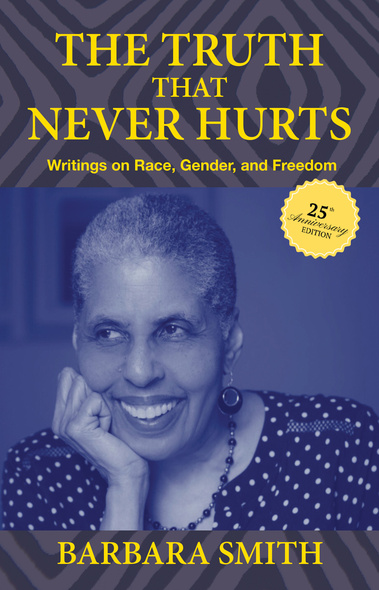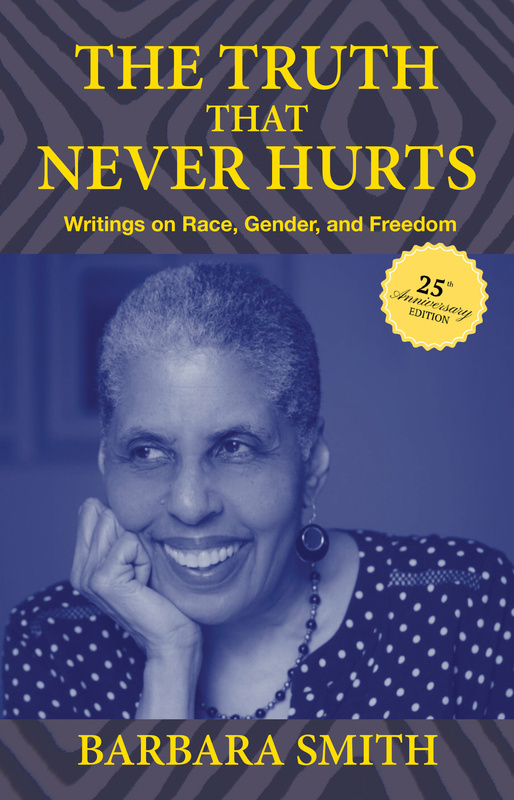
232 pages, 5 3/16 x 8
0 illustrations
Paperback
Release Date:13 Oct 2023
ISBN:9781978839045
Hardcover
Release Date:13 Oct 2023
ISBN:9781978839052
The Truth That Never Hurts 25th anniversary edition
Writings on Race, Gender, and Freedom
Rutgers University Press
Read an excerpt "Chicago Firsthand" (click here).
Barbara Smith has been doing groundbreaking work since the early 1970s, describing a Black feminism for Black women. Her work in Black women's literary traditions; in examining the sexual politics of the lives of women of color; in representing the lives of Black lesbians and gay men; and in making connections between race, class, sexuality and gender is gathered in The Truth That Never Hurts. This collection contains some of her major essays on Black women's literature, Black lesbian writing, racism in the women's movement, Black-Jewish relations, and homophobia in the Black community. Her forays into these areas ignited dialogue about topics that few other writers were addressing at the time, and which, sadly, remain pertinent to this day. This twenty-fifth anniversary edition, in a beautiful new package, also contains the essays from the original about the 1968 Chicago convention demonstrations; attacks on the NEA; the Anita Hill-Clarence Thomas Senate hearings; and police brutality against Rodney King and Abner Louima, which, after twenty-five years, still have the urgency they did when they were first written.
Barbara Smith has been doing groundbreaking work since the early 1970s, describing a Black feminism for Black women. Her work in Black women's literary traditions; in examining the sexual politics of the lives of women of color; in representing the lives of Black lesbians and gay men; and in making connections between race, class, sexuality and gender is gathered in The Truth That Never Hurts. This collection contains some of her major essays on Black women's literature, Black lesbian writing, racism in the women's movement, Black-Jewish relations, and homophobia in the Black community. Her forays into these areas ignited dialogue about topics that few other writers were addressing at the time, and which, sadly, remain pertinent to this day. This twenty-fifth anniversary edition, in a beautiful new package, also contains the essays from the original about the 1968 Chicago convention demonstrations; attacks on the NEA; the Anita Hill-Clarence Thomas Senate hearings; and police brutality against Rodney King and Abner Louima, which, after twenty-five years, still have the urgency they did when they were first written.
Barbara Smith's uncompromising intelligence helped invent the politics of intersection which grounds progressive thinking today. These essays deliver trenchant analysis from one of the most original, astute, and practical thinkers in the gay, lesbian, bisexual, and transgender movement.
At every moment of serious political crisis—and no thinking person can argue that ours is not such a moment—certain writers step forward with words that seem to ring from the very heart of history. Barbara Smith is certainly one of these writers, and her new book, electrifying, thought-provoking, illuminating, eloquent, harsh, and funny, is essential reading. Whether you agree with everything she says is not important; the essays in this book will revivify your heart and mind and reawaken a passion for activism and for justice.'
Barbara Smith is visionary, courageous, and insightful. Her work provides a crucial challenge to all of us.'
In these essays, Smith, an independent scholar and editor, explores several explosive issues, among them sexual politics, racism and women's studies, and homophobia.
A feminist writer and theorist of some repute, Smith founded Kitchen Table: Women of Color Press with the late 'black lesbian mother warrior feminist poet' Audre Lorde, and was the first woman of color appointed to the Modern Language Association's Commission on the Status of Women in the Profession. Her seminal 1977 essay Toward a Black Feminist Criticism, which puts forth the notion that a 'Black women's literary tradition' not only exists, but thrives, fittingly opens this collection of newer and older, still vibrant works, most previously published in often hard-to-find journals or anthologies. Noting that 'it is unnerving to imagine' what kind of writing she might have produced had she not come out, Smith registers obstacles to her current work on a wide-ranging history of black lesbians and gays in America, citing a recent two-volume encyclopedia (Darlene Clark Hine's Black Women in America) in which there are only six entries under 'Lesbian.' In the final essay of the collection, 'A Rose,' Smith recalls her friend, the late Lucretia 'Lu' Medina Diggs, and mourns the loss of her and Lorde, stressing that she will not be deterred from her fight for political awareness and compassion. Smith's writing frequently reaches strident polemicist peaks, but, just as frequently, stretches of sublime prose translate her crystalline intellect to the page, exciting both mind and senses.
A provocative collection of impassioned essays written from a radical, gay, African-American, feminist perspective. Smith, co-founder and publisher of Kitchen Table: Women of Color Press, has been publishing literary and social criticism for over 20 years. As a literary critic, she chastises the academic establishment for often misinterpreting and largely disregarding the voices of black women--gay black women in particular. In one of her most influential essays, 'Toward a Black Feminist Criticism,' written in 1977, Smith, contending that 'black women writers constitute an identifiable literary tradition,' pleads for a black feminist approach toward examining literature. Only the black feminist critic, she argues, is fully able to comprehend the nuances of work by black women, such as the depth of Sula and Nells relationship in Toni Morrisons novel Sula. Smith is also critical of nonlesbians addressing the black lesbian experience. In The Truth that Never Hurts, published in the late '80s, she argues that positive depictions of black lesbians are sorely lacking and that 'far too many non-lesbian black women who are actively involved in defining the African-American women's literary renaissance . . . completely ignore black lesbian existence or are actively hostile to it.' Smith's equally fervent social and political writings are informed by a Marxist viewpoint. She argues, sometimes unpersuasively, that heterosexism and sexism can wither only when capitalism is destroyed. She's especially concerned about the lack of role models for gay black youth; and she takes to task her gay brothers and sisters who have chosen to stay closeted because they are 'more concerned with their individual security and careers than they are with building community and working for radical political change.' This manifesto is always challenging and often convincing.
Smith's book is an excellent example of powerful, introspective writing that challenges readers to reexamine their stance on complex issues concerning race and gender.
Smith has provided us with a collection of erudite and profoundly moving writings [which are] smart, incisive, and instructive. There is no stone that Smith has left unturned. From homophobia in the black community to police brutality and including racism in the womenÆs movement, black women and anti-Semitism . . . Barbara Smith has explained the linkages between the multiplicity of oppressions facing blacks in general and black lesbians in particular.
The ancestors are surely ecstatic about the diligence, courage, passion, and good humor exhibited in The Truth That Never Hurts. This is a landmark work from a pioneering activist who has always kept the faith.
Sobering in what it has to tell us, The Truth That Never Hurts forces us to face those truths that disrupt the placid surfaces of our lives. A personal/political odyssey that documents some of the most critical moments in the last three decades of our national life, Smith's book forces us to new levels of awareness. Her piercing eye and uncompromising search for human justice for all make this volume must-reading for everyone who cares about the future.
Want to know how today's body of Black feminist writing and literature came into being? The Truth That Never Hurts tells a good part of the story…. When she tells the stories of the women who are her colleagues–Lucretia Diggs in ‘A Rose’ or of her aunt LaRue, who brought the young Barbara and her twin sister Beverly library books–Smith inscribes in history the chance networks that keep marginalized people, especially Black women writers and lesbians, alive and alert. That's the healing part of the world she brings alive here.’
Although the book is particularly valuable for young people who might not know the history and dynamics of Black women's involvement in second wave feminism, it is a work likely also to be of great interest to those in women's studies, to those interested in Black feminist theory and literary criticism, and to those committed to understanding the interlocking nature of multiple forms of oppression in American culture.’
The Truth That Never Hurts: Writings on Race, Gender, and Freedom provides a universal message about struggle, resistance, and freedom, grounded within a black Lesbian feminist critique of America's culture and politics. The cogently written essays represent a cross-section of Smith's work over the past twenty years and the first book dedicated exclusively to her own writing. Focusing on race, feminism, and the politics of sexuality, Smith provides an alternative lens to view the world by making connections between systems of oppression and offering suggestions for social change.
As a black lesbian feminist activist and scholar, Smith is a highly respected voice of conscience who speaks discomforting but necessary truths about the interlocking nature of oppressions within American culture and institutions. These landmark essays . . . show Smith challenging academic, political, and community organizations to expand their missions in order to include persons who have been perennially at the margins of our society. . . Recommended.
BARBARA SMITH is an author, activist, and independent scholar who has played a groundbreaking role in opening up a national cultural and political dialogue about the intersections of race, class, sexuality, and gender. She is the co-editor of Conditions: Five, The Black Women's Issue (with Lorraine Bethel); and All the Women Are White, All the Blacks Are Men, But Some of Us Are Brave: Black Women's Studies (with Akasha (Gloria) Hull and Patricia Bell-Scott). She is the general editor of The Reader's Companion to U.S. Women's History (with Wilma Mankiller, Gwendolyn Mink, Marysa Navarro, and Gloria Steinem), and is the co-author of Yours in Struggle: Three Feminist Perspectives on Anti-Semitism and Racism (with Minnie Bruce Pratt and Elly Bulkin). A collection of her essays, The Truth That Never Hurts: Writings on Race, Gender, and Freedom was published by Rutgers University Press in 1998 and was nominated for a Lambda Literary Award and was a Nonfiction Award finalist for the American Library Association's Gay, Lesbian, and Bisexual Book Award. Ain't Gonna Let Nobody Turn Me Around: Forty Years of Movement Building, edited by Alethia Jones and Virginia Eubanks, with Barbara Smith was published in 2014. It won the Lambda Literary Award for Lesbian Memoir/Biography and the Judy Grahn Award for Lesbian Nonfiction from the Publishing Triangle. Smith was the cofounder and publisher of Kitchen Table: Women of Color Press, the first U.S. Publisher for women of color until 1995, and served two terms as a member of the Albany Common Council from 2006-2013. In 2005, she was nominated for the Nobel Peace Prize.








